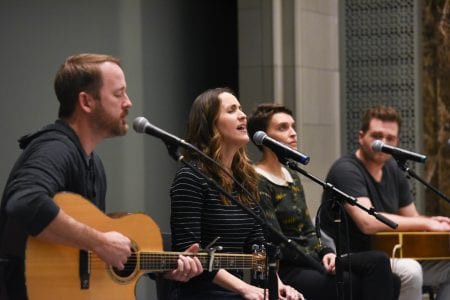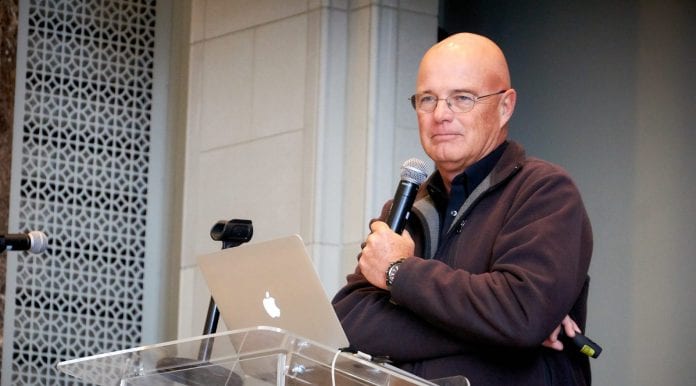Brian McLaren, author and activist, kicked off the Fifth Annual Symposium on Faith and Culture with Monday’s chapel presentation, “Seeing God in the Stranger: The Ethical Summons of Jesus.” As David Dark, professor of religion and chair of the symposium’s faculty committee, said, “Christianity is a movement and a practice, a way of being in the world,” and McLaren advocated for “a new kind of Christianity” that is just, generous and works with all peoples of faith for the common good.
He opened his discussion with a poem by Mary Oliver called “Making the House Ready for the Lord,” drawing comparisons to people’s need to distinguish themselves from ‘others.’ He said, “We develop a sense of who we are by depositing a sense of…privilege… over who others are.” But, Mclaren asserts, everyone is a brother and sister under God, and to be a Christian means that there is no ‘other.’
“When you’re inside Christ looking out at the world, that boundary marker [between yourself and others] counts for nothing. The only things that count are faith and love.” He described the demonstration of love as the “deepest non-negotiable” in Christianity.
As an example of this demonstration, he told this story:
In the early 1980’s, McLaren was working as an English teacher, and his office hours were interrupted by a call from World Relief one day. He agreed to invite a refugee family to live in his home, a visit that ended up lasting nine months and changing his life. His family then continued to take in several refugee families over the next few years, as his circle of friends from church also began to do. He noted that the people he took in were all different from him, in culture, appearance and faith, but when he got to know them, “they stopped being the ‘other,’ they became part of our family.”
A member in the audience noted during the Q&A afterward that living in love sometimes needs to be reconciled with the fact that wrongdoings have consequences. McLaren told a story of a man he took in once, whom he eventually asked to leave. He described it as a “painful decision, but it related to the fact that I loved him, and he needed help that I couldn’t give him.” He said, “There are decisions we make in the context of love…and you hope that you’ve done what you can.”
As for wrongdoings in the church, McLaren noted that “there are so many beautiful examples of individuals in congregations doing right… though sometimes it’s only the negative ones that get press.” But he also noted that people typically can’t always suppress negative feelings in favor of loving ones, and they shouldn’t. He said, “We are biologically wired for anger… What pain is the physical body, anger is to our soul.” He argued that anger is a manifestation of our own feelings, not consequences of others’ actions. “Anger is a normal, healthy and important reaction,” but must be dealt with accordingly, because a person’s response to their own anger can become the problem.
 This event was the first of several in the symposium, which discussed topics such as Jesus and ethics, faith and race, religion’s place in the world and overcoming faith obstacles. In addition, McLaren and Dark moderated a songwriter’s in-the-round event that featured alumni Andy Gullarhorn and Jill Phillips, along with Sarah Masen and Sam Ashworth.
This event was the first of several in the symposium, which discussed topics such as Jesus and ethics, faith and race, religion’s place in the world and overcoming faith obstacles. In addition, McLaren and Dark moderated a songwriter’s in-the-round event that featured alumni Andy Gullarhorn and Jill Phillips, along with Sarah Masen and Sam Ashworth.
This year’s theme, Prophetic Consciousness, worked to sustain an ongoing conversation relating to faith and culture. It also raised questions about what a contemplative presence in the world looks like and how individuals can make a difference with compassion in places of need.



